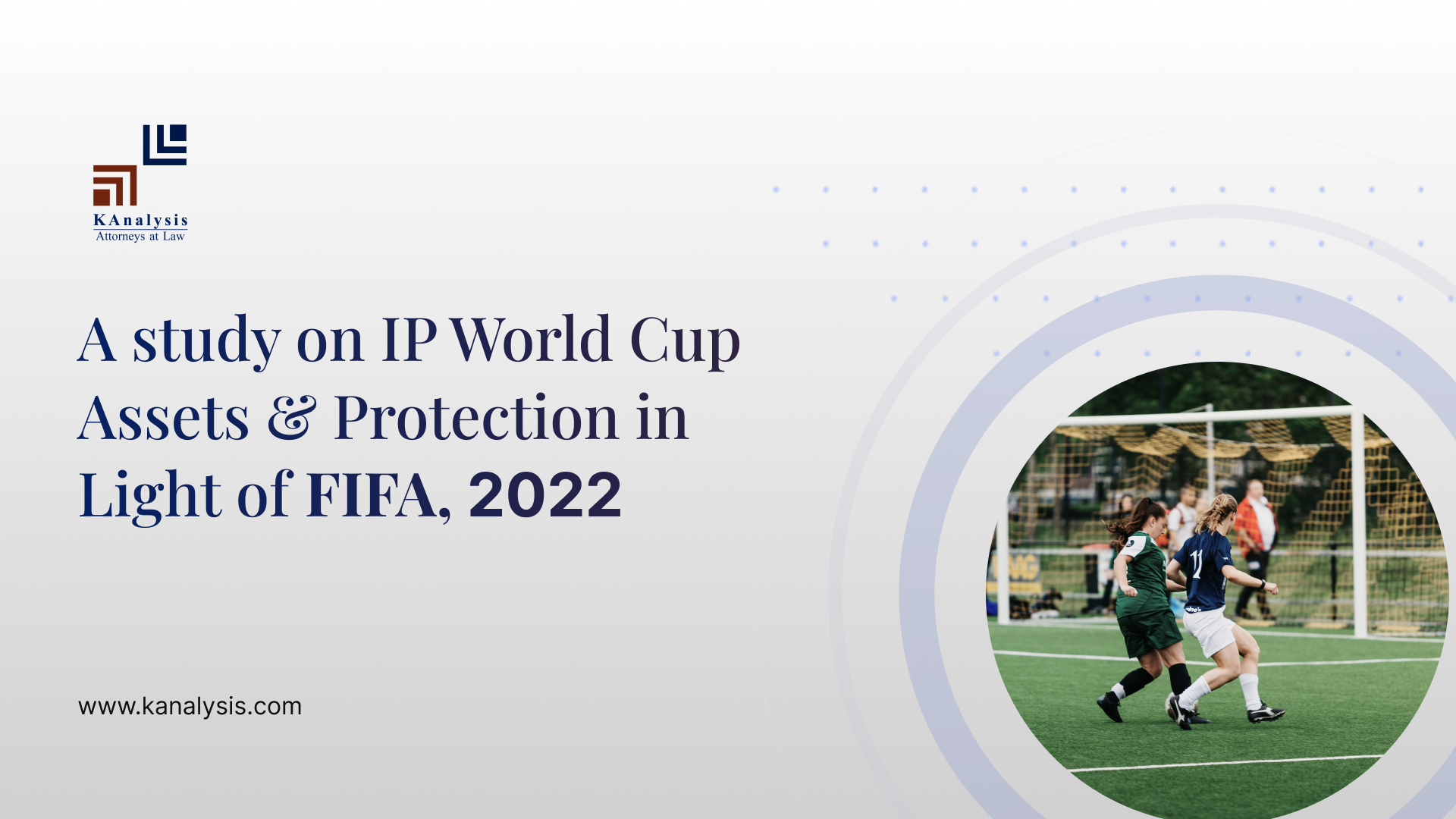With the end of the most controversial as well as the successful world cup in Qatar, 2022, it’s essential to analyze the IP protection given to all the assets surrounding the event. Any World Cup tournament’s planning and preparation start long before the opening game. The largest single sporting event in the world is the FIFA World Cup and the estimated viewing size and to put things in perspective, more than three billion people watched the previous World Cup in Russia, which included more than half of the world’s population above four and older. Thus, it is believed that 2022 edition’s viewership will cross the 5 billion mark. In addition, main aim of the organizers is not only on creating an adequate infrastructure but also on maintaining the brand value through its experience.
Need To Protect Ip World Cup Assets
A championship’s official emblem, authorized look, and legal mascot are typically included in its brand suite, along with potential additions like an official slogan, banner, etc. for the host city. The entire event needs a powerful brand that reflects the spirit of the competition and the host nation while creating strong emotional bonds with supporters around the world, starting from the early stages of event preparations to the interesting moments when the winning team receives the tournament trophy. FIFA constantly creates and safeguards a wide range of brand IP assets such as logos, slogans, titles, symbols, etc. or grants permission in the form of license for others to use in connection with its events, like the World Cup competitions.
World Cup sponsors spend a lot of money securing the exclusive rights to benefit from the publicity and goodwill that come with such a significant event. In exchange, the sponsors unquestionably look to FIFA to uphold certain standards of security. It would serve no purpose to become a sponsor if anyone could use the IP without restriction and thereby a s a result, FIFA might ultimately be unable to raise the money required for its tournaments and to expand the game internationally. Hence, it is essential to prevent the illegal commercial exploitation of the intellectual property and avoid the risk of losing the legal rights and title.
IP Issues Involved In Fifa World Cup, 2022
1. Sponsorship- For each FIFA event, a three-tier sponsorship structure is there with FIFA partners at the top, World Cup Sponsors at the second tier, and National Supporters at the third tier that help companies promote FIFA events in domestic market and often serves as the foundation for FIFA’s revenue model. One of the key tools for sponsorship is exclusivity, which draws sponsors for the money they will make from the event but, in the event of a breach, might seriously impair the partnership between the sponsor and the organizers. The biggest problem for the promoters is that legal action by its own has the potential to generate enormous exposure beyond what the brand would have initially anticipated thanks to social media.
2. Ambush Marketing- A non-sponsor of an event willfully makes an effort to give the appearance that they are the partner sponsor, without permission and without paying advertising charges. For instance, XYZ brand who’s not an official sponsor will make some people attending the event wear the shirts with their brand logo and make them sit in such a way that they are most of the times captured by camera. As a result, the impetus on official sponsors and right holders to take action against ambush marketing has increased along with the innovation of the rivals.
3. Protecting Various Marks- The World Cup trophy, the name QATAR 2022, official insignia, and event mascots are important tournament assets. Much like with prior hosts of events like with the Olympic Games and other World Cup competitions, Qatar has enacted specific regulations to control and oversee FIFA’s and its business partners intellectual property rights. The law recognizes FIFA’s world cup trademarks as well-known and protected in Qatar regardless of whether they are registered there.
4. Players Image and Likeness- Some brands use players image and likeness to promote their brand without any authorization and thereby violating a players personal IP. For instance, brands may post a player’s image on its social media handle congratulating him on any achievement and thereby putting brand’s logo or tagline with it and as a result tend to gain on a player’s goodwill.
5. Counterfeit Products- There are companies who make products using FIFA’s trademarks without the necessary licenses. Many unofficial goods are regarded as counterfeits, and they can be distinguished from legitimate goods by their lower grade, potential sale under a different brand name, or lack of the necessary authentication features.
Steps Taken To Protect IP Assets
- FIFA Intellectual Property Guidelines
The FIFA IP Law primarily gives adequate protection for FIFA’s IP rights by making it simpler to register such material with the Intellectual Property Rights Protection Department at the Ministry of Commerce and Industry and also acknowledges that FIFA’s trademarks are well-known trademarks and are therefore covered under the Paris Convention for the Protection of Industrial Property, 1883 to which Qatar is also a signatory. Moreover, this law also covers the registration of FIFA’s intellectual property with the Department, whether it is done directly by FIFA or by a delegate, as well as FIFA’s enquiries regarding already registered intellectual property. It also addresses any objections made by individuals against the Department’s move to approve the registration of FIFA’s intellectual property after the decision had been published in the Gazette.
According to the law, FIFA is exempt from submitting the declaration mandated by Article 45 of Law No. 7 of 2002 on the Protection of Copyright and Related Rights, which states that an applicant should submit related material with the intellectual property registration application, such as the name of the author or authors in respect of joint works or the name of any owner of related rights, the subject matter of the work or subject matter of the related rights, a written statement by the authors of the ownership of a work, or any related right and rights conferred on them.
- EMIR LAW ON FIFA IP PROTECTION
On July 29, 2021, the Emir published FIFA IP Law No. 11 of 2021 on the Protection of Trademarks, Copyrights and Related Rights of Fédération Internationale de Football Association (“FIFA”). Depending on the law, Qatar is currently hosting the FIFA World Cup. In accordance with the Law, FIFA is also exempt from paying the registration fees for any of its trademarks, works, audio recordings, performer rights, or radio broadcasts. Regardless of the fact, if FIFA’s trademarks are registered in Qatar, the law recognises them as well as secures their protection so long as they are in any of the several countries around the world that have ratified the Paris Convention for the Protection of Industrial Property. FIFA was also given an expedited process by the Law for contesting dubious third-party trademarks.
The law improving and streamlining the process for registering and securing the group’s rights to intellectual property during the event has a broad scope and protects the governing body of football’s trademarks and copyrights. FIFA’s commercial rights for the competition are governed specifically by Chapter 6 of Law No. 10/2021. It outlines these rights and covers a wide range of topics, including rights pertaining to musical compositions, broadcasting, and even logos, billboards, and mascots. The legislation forbids anybody from tampering with the aforementioned rights by using, recording, selling, or imitating them without FIFA’s consent. Similar limitations are placed on the acquisition and use of domain names that contain FIFA’s registered trademarks.
It’s also against the law to use commercial endeavours that might be seen as connected to FIFA or the Supreme Committee for Projects and Legacy, as well as to include the cost of tickets in trip packages without FIFA’s express consent and to broadcast public events without a licence. Those that have permission or a licence are required to follow FIFA regulations. Additionally, without a licence, tickets cannot be printed, resold, transferred, or swapped. Tickets can only be distributed and sold by FIFA. It may, however, provide permission to others to act on its behalf. FIFA shall make decisions regarding the conditions of ticket purchases, exchanges, and data management. Such areas might restrict commercial business by parties other than FIFA and its business partners. According to the law, all products that FIFA and its partners advertise may be advertised and sold in these areas. After all, FIFA sponsors make a sizable financial contribution to the event’s funding in exchange for the exclusive rights granted to them. The FIFA World Cup 2022 could not be hosted or carried out without such contributions.
CONCLUSION
Regardless of the happy faces or the broken hearts after ending of the FIFA world cup, 2022, intellectual property has certainly emerged on a strong footing till now and shall keep on evolving. Though the aforementioned laws give a strong protection to IP assets of FIFA but there are still instances of infringement which needs to be tackled. Thus, FIFA is undoubtedly playing its role as the goalkeeper with its portfolio of intellectual property assets, laws, regulations, and protection initiatives. Its response might not always be strong, and some nations might have limited IP legal frameworks. FIFA, though, will undoubtedly deny its rivals a penalty kick.
REFERENCES
- FIFA, FIFA Intellectual Property Guidelines, June, 2022, available at:
- Law No. 11 of 2021 on Protection of Trademarks, Copyrights, and Related Rights of FIFA, available at: https://almeezan.qa/pdf/2021/10.pdf
Subscribe to our monthly newsletter here and read all our blogs here


